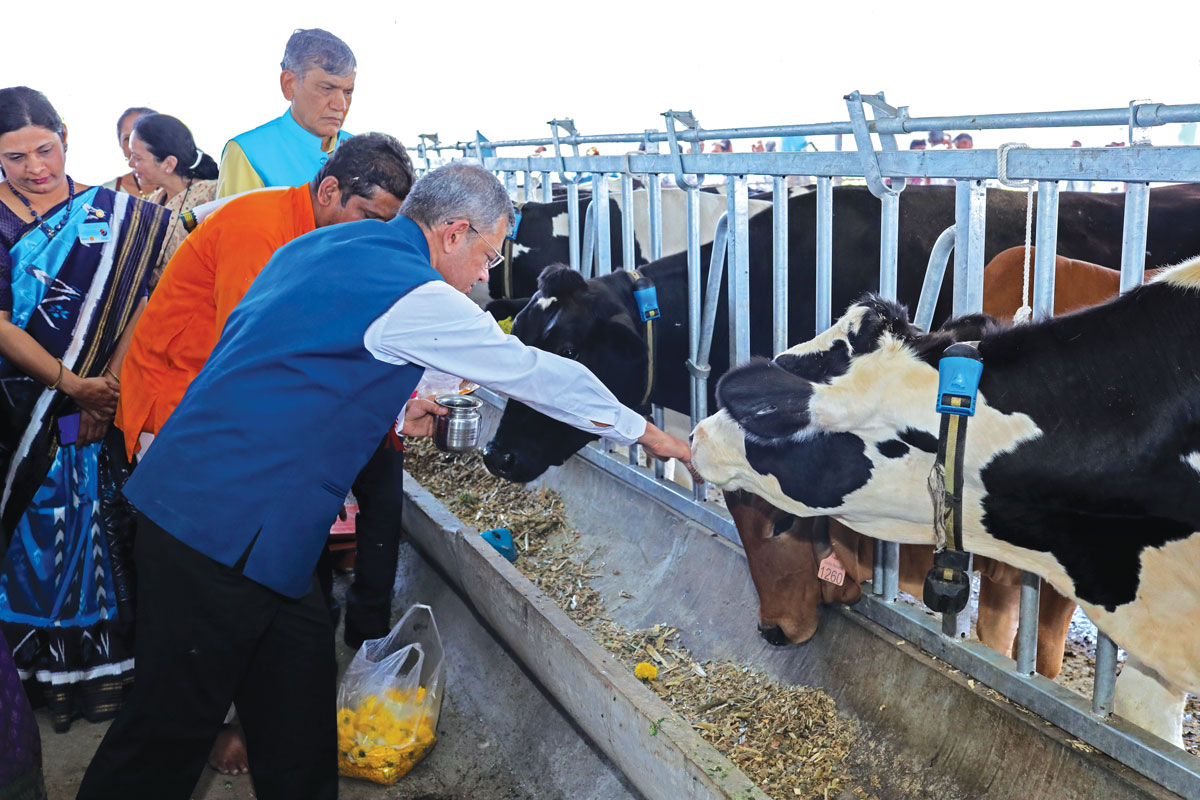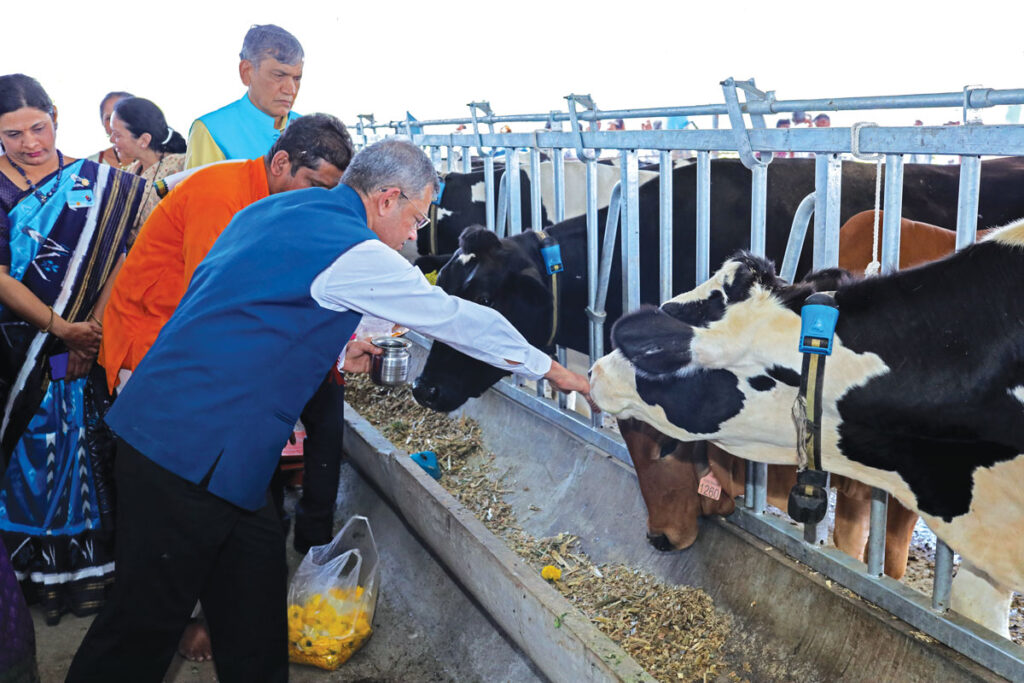When Madhura Zaware, president of the Rotary Club of Ahmednagar Mid Town, RID 3132, read a book titled America, written by the Marathi writer Anil Avchat, about a unique project done in the US to facilitate the rehabilitation of Vietnam Veterans, it left a deep impression on her mind. It described how the war veterans were kept in close proximity to horses for mental stability. The honest, genuine and unpretentious love of animals gave them mental healing.

This information has provided the background for the setting up of the Rotary Swayampoorna Dairy at an NGO near Ahmednagar for mentally disturbed and destitute women through a $48,000 global grant done by this club. The partner club is RC Miami Airport, RID 6990, US.
This NGO, Mauli Seva Pratishthan, located about 20km from Ahmednagar city, provides shelter and treatment to mentally deranged and disturbed women who are rejected by their own families and left to mend for themselves, invariably falling prey to all kinds of unsavoury elements. At this centre, “they get their home, food and warmth. The couple, Dr Rajendra and Dr Sucheta Dhamane, are caring for more than 500 such women and their 50 children with great care and affection,” says Madhura.

A few years ago, she became aware of the wonderful work being done by this NGO, and her club started helping out its inmates in various ways. Sharing a few heartbreaking, and yet heartening stories of hope, Madhura told Rotary News about Anuja, who is actually from Goa. She was born to her parents in their late age, and so her siblings were 15 years older than her. By the time she reached puberty, her parents died and her elder siblings refused to take responsibility for her. She somehow managed to find some work, and completed her education in law, and started internship under a famous lawyer in Goa.
But she was exploited by the much older male lawyer, and ended up pregnant. When this was known to the local community, she was taunted and asked to leave the locality. The torture put tremendous stress on her mind, and she became mentally deranged. When a good Samaritan found her wandering on the streets in a disturbed state, he organised her transport all the way to Ahmednagar and the NGO Mauli. Here she found a home, care and some peace at last.

The plight of Pooja and Suman was similar. Pooja was raised in an orphanage for children which she had to leave after she completed 18. But with no job or a home, she ended up on the streets, was abused by some men and ended up at Mauli in a psychotic state.
Suman lived in a nearby village and used to walk to the taluk school every day in pursuit of an education. Somehow, she managed to reach Class 10, but one evening, while returning home alone, she was raped by some young men. Her family blamed her and stopped her from attending school. After a couple of months, when they found she was pregnant, Suman, who was barely 15, was thrown out. “Forced into unwanted motherhood at such a tender age, she lost her mental balance. Luckily, one day, while wandering on the road, she caught the eye of a good man, who directed her to Mauli,” says Madhura.
The admirable and humanitarian work done by this NGO has been recognised by many organisations, including RC Hong Kong, which has honoured it with The One Rotary Humanitarian Award. “Many members of our club, which has a membership of 100, regularly donate money to the NGO and we have also been doing some projects with them; in 2020–21, we donated about 40 beds for the children living here.”
Next in partnership with RID 6690, US, the club carried out the Healthy Tiny Feet project, in which shoes were given to the children living here. “Gradually, over a period of time, women such as Anuja, Pooja, Suman and all the kids in Mauli have become an integral part of my life and heart. And there was a deep desire in my heart that our club should do something to make this donation dependent organisation become self-sufficient and self-sustaining,” says Madhura.
She thought if the club could do some kind of self-sustaining project that would give the women a purpose in life, and generate a decent income for the NGO, it would be a win-win for everybody. “We already knew that these women can do goat and cow rearing and some agricultural activities very well. Once somebody had donated three cows to the NGO, and we found that not only did these women take good care of the bovines, they also talked to them regularly, like they would to close friends and even shared their grievances with them. And it was then that I suddenly remembered the Vietnam Veterans story I had read.”
The club president thought that if a similar situation was created here, replacing the horses with cows, “it could be used as a psychological treatment for the women inmates, while creating financial self-reliance for the institution. And then the idea of setting up a dairy with good quality cows at the Mauli Seva Pratishthan took root.”

The idea was discussed with the “veterans” at the club, and the founders of Mauli too. The members learnt that the women were so attached to the three cows donated earlier, that when one of these cows became pregnant, the women took such good care of it, as they would of their own pregnant daughters.
But the amount required to buy 15 good quality cows and set up other facilities such as a vermiculture unit, growing fodder for the cows and generating fuel from cow dung etc was rather huge, and it was here that the project team got encouragement and guidance from the then DG Swati Herkel and DRFC of RID 6990, US, Manohar Mahajan (whose son-in-law lives in Ahmednagar) to do a global grant for $48,000 with the US club. With some other local clubs — RCs Beed, Beed Mid Town and Ahmednagar — joining in, the project was further strengthened.
The women at the NGO were so attached to the three cows donated earlier, that when one of these cows became pregnant, they took such good care of it, as they would of their own pregnant daughters.
When the GG funds came through, 15 cows were purchased from the Godrej Centre near Nashik which breeds quality cows capable of giving up to 35–40 litres of milk a day. It was decided to set up a complete system including sensors (monitoring system), a milking parlour, a dung gas plant and a vermiculture plant. Cow fodder will be grown by the women here in the three acres of land belonging to the Mauli Pratishthan. For this, the vermiculture prepared using cow dung will be used as organic fertiliser. The milk collected will be taken to the regional milk collection centre located 2km from Mauli. The dung gas produced will help reduce the expenditure on LPG in the kitchen. “We’ve tried to make this project as self-sustaining as we possibly can,” smiles Madhura.

The project was recently inaugurated by TRF trustee Bharat Pandya, who praised the club members for the meticulous manner in which they had planned the entire infrastructure to make it a totally self-sustaining project. “This is yet another example of how TRF helps Rotarians do good in the world,” he said. IPDG Swati Herkel too congratulated the club members for their steadfastness and pursuing their dream.
Recently RI Director Raju Subramanian visited the project and interacted with the women and children. “It was mind blowing to see the noble work that is being done at this centre. Talking to the women and listening to their stories brought tears to my eyes. While the courage these women have displayed is tremendous, it is difficult to digest the fact that there is such a cruel world out there. I congratulate the couple who is doing this fantastic work and members of RC Ahmednagar Mid Town, who are collaborating with this NGO to provide these women a sustainable livelihood,” he said.

“Do allow me to add that the guiding principle behind this entire project is the then RI President Gordon McInally’s constant appeal to Rotarians to take care of the mentally disturbed and mentally-challenged people in our communities,” she says. She also thanked PDG Pramod Parikh, her club’s International Service director Kshitij Zaware, PDG Rukmesh Jakhotia, DRFC Suhas Vaidya and club trainer Vijay Ingale.
But the last word has to go to the couple who have so lovingly nurtured Mauli. “Many a times, when we see women wandering on the roads, we call the NGO, and in 30 minutes a van comes and the expert manner in which their staff talk to these mentally disturbed women, who are very prone to violence and agitation and refuse to allow anyone to come near them obviously because of the physical abuse they have experienced, has to be seen to be believed. The women are quietly picked up, taken to Mauli, cleaned, fed and looked after with the utmost care. We hope to continue to work with them in the future too,” adds Madhura.








